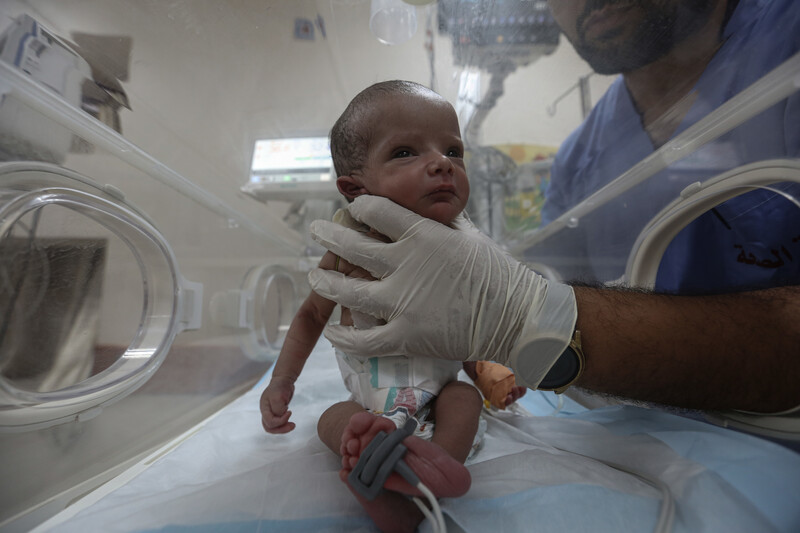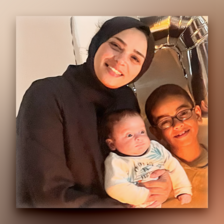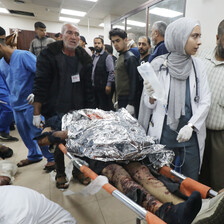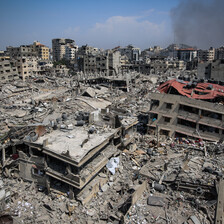The Electronic Intifada 23 January 2025

A premature baby at al-Aqsa Hospital’s NICU in Deir al-Balah.
The Electronic IntifadaWar is typically associated with destruction, death and despair.
Yet, amid the chaos and danger, there are instances where individuals and couples express a desire to conceive and bring new life into the world.
This phenomenon is deeply complex and can be influenced by a multitude of factors, from cultural and personal beliefs to psychological and social dynamics.
Does a newborn fill the void left by a lost one?
Do harsh conditions and the specter of death impede the innate human desire to reproduce and preserve future generations?
In the initial months of Israel’s genocidal assault on Gaza, there was a noticeable drop in the number of new pregnancies, leading to a decline in birth rates in July 2024.
It was predictable that these statistics would decline during such violent times. As Israel’s genocide extended into its ninth month, all those who conceived before the war had given birth.
Over time, however, persistent fear and difficult living conditions seemed to coexist with a renewed desire to have children and sustain life.
Conflicted
I observed this phenomenon during my work at different obstetrics and gynecological clinics in Gaza over the past 14 months, including at Al-Shifa Hospital in Gaza City and Nasser Medical Complex in Khan Younis.
In the first months of Israel’s assault, no one came to remove contraceptives, monitor ovulation, stimulate ovulation or inquire about infertility. In June and July, however, despite continued genocide, these concerns and questions resurfaced.
One woman, with a mix of sorrow and hope, confided in me that she wanted a pregnancy test after her period was a week late.
“Pray that I am pregnant! I had a son at the start of the war after eight years of infertility and treatment, but he was martyred three months ago.”
I was deeply conflicted. Should I rejoice if the test is positive, knowing she conceived without another long struggle. Or should I feel sadness for the challenges she will face during pregnancy in such difficult conditions?
How did this mother manage to cope with the pain of her loss?
Did her grief fuel her desire to conceive again?
In the event, the test came back negative. I felt deep sympathy for the would-be mother. But I also felt a sense of relief. I hope she will eventually conceive under better circumstances.
Motivation
I continue to ponder the motivations driving women to seek pregnancy under the incredibly harsh conditions – indiscriminate military violence, famine, homelessness, and a near total lack of health care – they had to endure for 15 months.
Some are upfront. One woman told me straight out that she had lost a son and “we want to have another child to replace him.”
Can a new baby truly replace a lost one in these circumstances?
Or is it the innate human drive for survival and the difficulty of accepting loss?
Another woman simply seemed to desire normalcy.
“We got married two years ago, started treatment before the war, but then had to stop,” she told me. “The war has dragged on, and we want to know if we have any fertility issues because we want to conceive.”
I feel helpless in the face of such questions. There are no laboratories available to conduct the necessary tests, nor are there procedures that could be performed if we identified a problem. There is no laparoscopy, artificial insemination or In Vitro Fertilization.
Some sixty percent of the women receiving care at the obstetrics and gynecological clinic where I now work, the International Medical Corps’ field hospital in Deir al-Balah, are in the first half of their pregnancy. The fact that these women desire to conceive despite what was an ongoing genocide against the people of Gaza, must come from a deeply emotional place rather than a rational one.
Despite the considerable risks, several psychological, emotional and societal factors play significant roles in the decision to have children during wartime.
As a coping mechanism, finding purpose and creating a sense of normalcy in the chaos of war can be vital, with the decision to have a child providing an anchor amidst the turmoil.
Additionally, the desire to create life can stem from a need for emotional connection and bonding, especially when surrounded by loss and destruction.
Think hard
In dealing with loss, individuals who have lost family members to the conflict may seek to rebuild their families through childbirth, and pregnancy and the birth of a child can be perceived as a way to heal from the trauma of war, offering a form of emotional renewal and hope.
Cultural and social expectations, in addition, can compel individuals, particularly newly married women, to fulfill traditional roles of motherhood regardless of the circumstances.
I worked with one such young woman at the outset of the genocide, who had just been married and felt powerless to resist family pressure to conecive as quickly as possible.
Additionally, religious beliefs often underscore the importance of procreation, seeing it as a divine duty that transcends situational hardships.
Moreover, the longer the duration of a conflict, the resulting uncertainty over the future can prompt some to prioritize having children now rather than waiting for stability.
Despite all these factors, however, the lack of healthcare, malnutrition and the psychological strain of war make pregnancy highly perilous.
My advice to women and couples thinking of pregnancy is to think hard, not just for physical and psychological considerations.
Just as important are the more prosaic ones that genocide imposes on you, the questions you need to answer: Do you have access to baby milk, diapers, hygiene products, and enough food to keep a new mother well-nourished?
Are you safe where you are staying?
And I would suggest professional counseling – if any is available – to those desiring children in this situation. Emotional support is essential for women facing reproductive decisions in war.
Dr. Roba Almadhoun is an obstetrician in Gaza.





